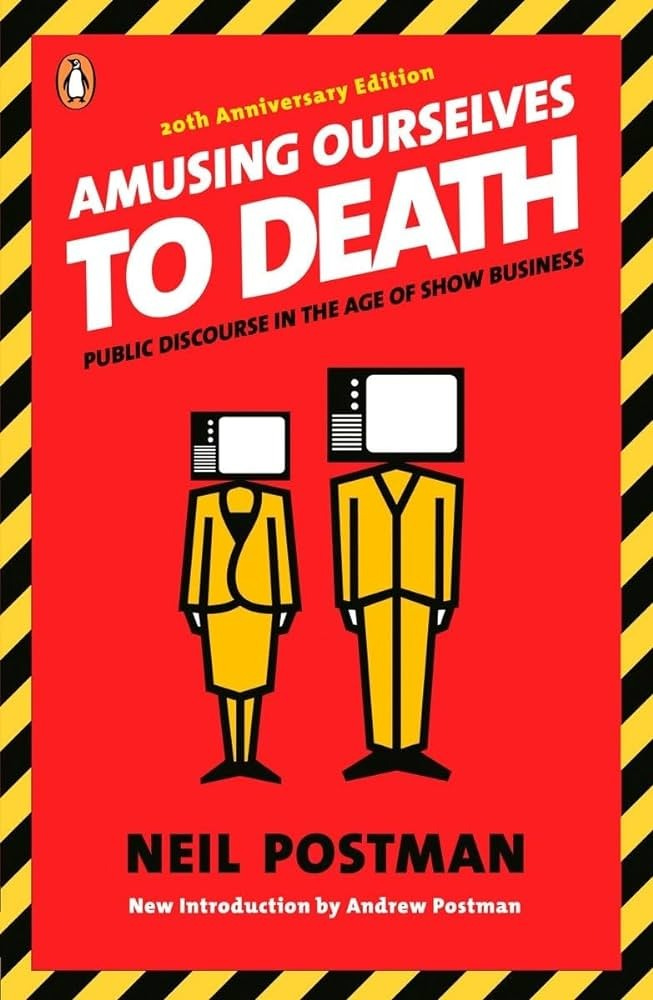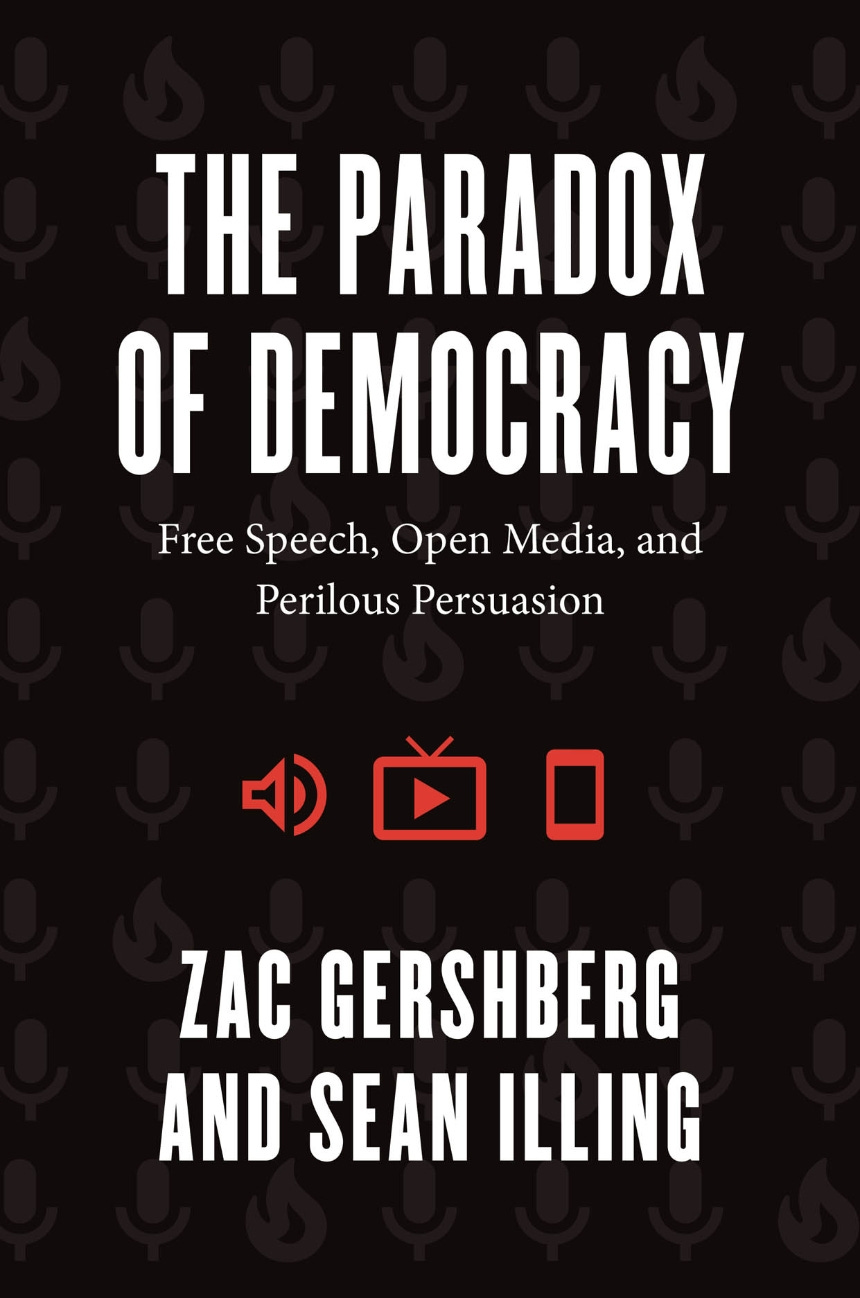In the Schoolhouse
On Sunday, my students submitted their first papers: rhetorical analyses of Neil Postman’s Amusing Ourselves to Death: Public Discourse in the Age of Show Business (1985).
Postman, one of the 20th century’s most important media ecologists and cultural critics, died in 2003. He’s been stalking me since I started teaching in 2015.
In August of that year, while I was packing up my apartment in Providence and preparing to move to Cambridge, I got an email from my school’s dean welcoming me to the History department and laying out the schedule for New Teacher Orientation. We had homework: reading from Parker Palmer’s The Courage to Teach, Lisa Delpit’s The Silenced Dialogue, Paolo Freire’s Pedagogy of the Oppressed, The Rule of St. Benedict, and the first chapter of Neil Postman’s The End of Education (1990).
That chapter is titled “The Necessity of Gods.” In it, Postman writes:
“With some reservations but mostly with conviction, I use the word narrative as a synonym for god…A god, in the sense I am using the word, is the name of a great narrative, one that has sufficient credibility, complexity, and symbolic power to enable one to organize one’s life around it…it tells of origins and envisions a future, [it is] a story that constructs ideals, prescribes rules of conduct, provides a source of authority, and, above all, gives a sense of continuity and purpose.”
What does the god-narrative have to do with school? “Without a narrative, life has no meaning,” Postman says. “Without meaning, learning has no purpose. Without a purpose, schools are houses of detention, not attention.” This, to me, is strikingly similar to a line Simone Weil often heard as a student, from her most important teacher, the French philosopher Alain: “Attention is religious, or it is nothing.”
I stayed in Room 103 until eight each evening during my first two weeks teaching, drowning in learning how to write a lesson with teeth, but somehow I found time to read the entirety of The End of Education, which proves more valuable for my vocational energy each time I read it. It is, in many ways, a transgressive book–perhaps more so now than in 1990. Postman begins with a question everyone seems to be asking these days, but almost none of them in Postman’s words: “What happens to people when they have no gods to serve?” I was introduced to his rhetoric as a teacher in a Catholic school, but Postman was explicitly focused on the end (read: goal) of public education. “The question is not,” he wrote, “Does or doesn’t public schooling create a public?”
“The question is, What kind of public does it create? A conglomerate of self-indulgent consumers? Angry, soulless, directionless masses? Indifferent, confused citizens? Or a public imbued with confidence, a sense of purpose, a respect for learning, and tolerance?”
He made clear that every god-narrative is an inherent risk, that some narratives are more dangerous and seductive than others, and that even the good ones are liable to corrosion in unhealthy societies. His own life saw the emergence of “three catastrophic narratives: the gods of communism, fascism, and Nazism, each of which held out the promise of heaven but led only to hell.” Life in a hell-narrative, he argued, was still better than life divorced from any narrative at all: “To be nowhere means to live in a barren culture, one that offers no vision of the past or future, no clear voice of authority, no organizing principles. In such a culture, what are schools for? What can they be for?”
Again, stunningly similar to one of Weil’s emphatic declarations in Gravity and Grace: “We must prefer real hell to imaginary paradise.”
I finally read Amusing Ourselves to Death, which preceded The End of Education by five years, during lockdown in 2020. Two years later, when I was assigned to Introduction to Rhetoric at UI, I knew it was the book I wanted to teach. Postman opens this magnificent work of cultural criticism saying, “This book is an inquiry into and a lamentation about the most significant American cultural fact of the second half of the 20th century: the decline of the Age of Typography and the ascendancy of the Age of Television.”
Postman wasn’t the first critic to wring his hands over the decline of reading, and certainly hasn’t been the last. Just yesterday in The Atlantic, Rose Horowitch reported on the decline of teaching full-length books in secondary schools, and how that has led to a generation of college students, even on historically elite campuses, who struggle to finish book-length texts. English professors, even whole departments, have dropped them from their syllabi.
Essentially, Postman was one of the first cultural critics–second only to Marshall McLuhan–to pay serious attention to the social, cultural, and political consequences of the rise of digital media’s ubiquity in American households. He argued that its dominance as society’s governing medium would make entertainment “the supra-ideology of all discourse,” and many of his claims about TV are eerily prescient about social media, so much so that my Rhetoric students sometimes forget that Postman was writing in 1985, and write their papers as if he is alive and well today, lamenting their own generation’s obsession with TikTok and Snapchat.
They have some critiques of Postman’s argument, but none of them take issue with the way he establishes the philosophy underpinning the book. In the prologue, he contrasts two dystopian visions of democracy’s future:
“We were keeping our eye on 1984. When the year came and the prophecy didn’t, thoughtful Americans sang softly in praise of themselves. The roots of liberal democracy had held. Wherever else the terror had happened, we, at least, had not been visited by Orwellian nightmares…But we had forgotten that alongside [George] Orwell’s dark vision, there was another - slightly older, slightly less well known, equally chilling: Aldous Huxley’s Brave New World. Contrary to common belief…Huxley and Orwell did not prophesy the same thing. Orwell warns that we will be overcome by an externally imposed oppression. But in Huxley’s vision, no Big Brother is required to deprive people of their autonomy, maturity and history. As he saw it, people will come to love their oppression, to adore the technologies that undo their capacities to think…What Orwell feared were those who would ban books. What Huxley feared was that there would be no reason to ban a book, for there would be no one who wanted to read one. Orwell feared we would become a captive culture. Huxley feared we would become a trivial culture…as Huxley remarked in Brave New World Revisited, the civil libertarians and rationalists who are ever on the alert to oppose tyranny “failed to take into account man's almost infinite appetite for distractions.” In 1984…people are controlled by inflicting pain. In Brave New World, they are controlled by inflicting pleasure. In short, Orwell feared that what we hate will ruin us. Huxley feared that what we love will ruin us.”
However they respond to the rest of the book, when I ask my students, “Does this seem an accurate reflection of your world?” they answer unanimously: “Absolutely.”
Ezra Klein and Sean Illing gave a fantastic summation of Amusing Ourselves to Death two summers ago, in a discussion of Postman’s continued relevance to politics and culture in the US today and the way the book informed Illing’s own, The Paradox of Democracy: Free Speech, Open Media, and Perilous Persuasion, which he co-authored with Zac Gershberg.
Gershberg and Illing take Postman’s torch and consider how the media that shape our realities and forms of communication influence 21st century democratic (dys)function. Illing notes:
“It’s not for nothing that fascism has only ever emerged out of democratic societies. There’s something about the collision of mass media and mass politics that made fascism possible. If fascism can emerge out of a democratic society, anything can…the very thing that makes democracy possible, which is wide open, free expression–while that’s a condition of democracy, it can also be hijacked and turned against it…So the thing that makes it possible is also the thing that threatens it from within. And that tension or that paradox is baked into the structure of democracy…And in that sense, democracy is just sort of situated on a precipice, always. There’s just no transcending that, right?”
In Vol. 1, I wrote about the value of encouraging a culture of risk-taking, both in classrooms and at a larger societal level. I’m struck by Illing’s thesis because of how powerfully it reminds us that because a democracy is an inherently risky political structure and project, it requires for its sustainable endurance an equal measure of cultural and political risk-taking to protect it from antidemocratic and illiberal forces. I decided to become a teacher because I believe classrooms are where students learn to take those kinds of risks first, and where teachers explain what is at stake when a society descends into the collective passivity Aldous Huxley, and Neil Postman, warned us about.
What I’m Reading:
Eliza Griswold’s Circle of Hope: A Radical Mission; A Riveting Crisis; The Future of Faith.
I’m reading this wonderfully reported book, which was named a finalist for a National Book Award today, with my church book club. It’s about a Philadelphia-based evangelical church, but not the kind of far-right or far-right-flirting evangelical church that mainstream media usually portrays. Griswold has written a fascinating portrait of an American church trying to understand its role, place, and purpose in a polarized country’s uncertain time.
What I’m Listening To:
Emily Hanford’s “Sold a Story: How Teaching Kids to Read Went So Wrong.” I will be writing more about this podcast and its importance in a future post, but I want to plug it here because I think it’s essential reporting that every single American should know about. (Come to think of it, the history of literacy instruction Hanford investigates has a huge amount to do with the decline of book-teaching on college campuses discussed in the Atlantic feature linked above.) Hanford released seven episodes in 2022 about reading instruction in elementary schools here and in Western Europe, and she recently followed-up with a few more about the podcasts’ political impacts.
While school content and curricula (what we teach) often gets a lot of play in mainstream news, especially nowadays, instructional pedagogy (how we teach) gets less attention. Hanford did a deep dive into the evolution of reading pedagogy over the past several decades, the science that informs that pedagogy, and the political forces that get in the way of that science. (Heads up: The political bad guys in this story are not who you think they are.) If you have children in school currently, you need to listen to this yesterday. If you’re a teacher, especially at the elementary school level, this podcast is for you.







“We must prefer real hell to imaginary paradise.” There's Donna's healing power of rigor! Or as Lorde sings in Buzzcut Season, "nothing's wrong, when nothing's true"